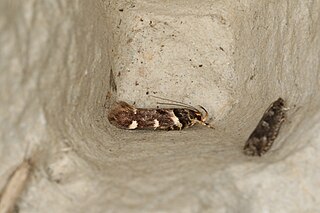
Macrobathra is a genus of moths in the family Cosmopterigidae. Most species are endemic to Australia.
Macrobathra gentilis is a moth in the family Cosmopterigidae. It is found in India.
Macrobathra baliomitra is a moth in the family Cosmopterigidae. It was described by Turner in 1932. It is found in Australia, where it has been recorded from New South Wales.
Macrobathra bigerella is a moth in the family Cosmopterigidae. It was described by Francis Walker in 1864. It is found in Australia, where it has been recorded from New South Wales.

Macrobathra ceraunobola is a moth in the family Cosmopterigidae. It was described by Edward Meyrick in 1886. It is found in Australia, where it has been recorded from Tasmania.
Macrobathra eudesma is a moth in the family Cosmopterigidae. It was described by Oswald Bertram Lower in 1900. It is found in Australia.
Macrobathra euryxantha is a moth in the family Cosmopterigidae. It was described by Edward Meyrick in 1886. It is found in Australia, where it has been recorded from Queensland.
Macrobathra hemitropa is a moth in the family Cosmopterigidae. It was described by Edward Meyrick in 1886. It is found in Australia, where it has been recorded from South Australia.
Macrobathra heterocera is a moth in the family Cosmopterigidae. It was described by Oswald Bertram Lower in 1894. It is found in Australia, where it has been recorded from Tasmania.
Macrobathra heterozona is a moth in the family Cosmopterigidae. It was described by Edward Meyrick in 1889. It is found in Australia, where it has been recorded from Western Australia.
Macrobathra hexadyas is a moth in the family Cosmopterigidae. It was described by Edward Meyrick in 1906. It is found in Australia, where it has been recorded from Queensland.
Macrobathra micropis is a moth in the family Cosmopterigidae. It was described by Oswald Bertram Lower in 1894. It is found in Australia, where it has been recorded from Queensland.
Macrobathra monostadia is a moth in the family Cosmopterigidae. It was described by Edward Meyrick in 1886. It is found in India, Sri Lanka and Australia, where it has been recorded from Queensland.
Macrobathra niphadobola is a moth in the family Cosmopterigidae. It was described by Edward Meyrick in 1886. It is found in India and Sri Lanka.
Macrobathra psathyrodes is a moth in the family Cosmopterigidae. It was described by Turner in 1932. It is found in Australia, where it has been recorded from Queensland.
Macrobathra rubicundella is a moth in the family Cosmopterigidae. It was described by Francis Walker in 1864. It is found in Australia, where it has been recorded from Queensland.
Macrobathra sarcoleuca is a moth in the family Cosmopterigidae. It was described by Edward Meyrick in 1915. It is found in Australia, where it has been recorded from Queensland.
Macrobathra synacta is a moth in the family Cosmopterigidae. It was described by Edward Meyrick in 1920. It is found in Australia, where it has been recorded from South Australia.
Macrobathra synastra is a moth in the family Cosmopterigidae. It was described by Edward Meyrick in 1886. It is found in Australia.
Macrobathra vividella is a moth in the family Cosmopterigidae. It was described by Cajetan Felder, Rudolf Felder and Alois Friedrich Rogenhofer in 1875. It is found in Australia.

